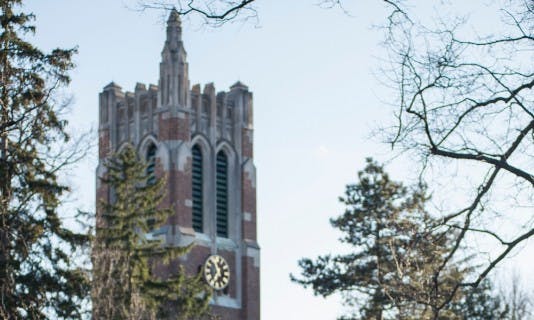Pittsburgh currently hosts more bridges than any other city in the world. Pittsburgh-based physician Dr. Jim Withers used this motif of bridges while discussing crossing social barriers in medicine during his talk at MSU July 9.
While at Mercy Hospital in Pittsburgh, Withers integrated himself into the homeless community, breaking unspoken rules and preconceived notions on who should recieve health care
“There was a reality gap between the hospital and where I want it to be,” Withers said.
A number of his fellow residents ignored the signs of domestic violence because it either was "not their place" or they felt that they could not do anything about it, Withers said. Withers saw many domestic violence victims and so they became identifiable to him in his street medicine endeavors.
Withers said fellow residents and the hospital unknowingly created a reality gap. This problem moved Withers' focus to people who did not have the insurance or ability to go to a hospital. This shift in thinking lead to the formation of a street medicine team called Operation Safety Net.
“How do you start working under bridges?" Withers asked. "You look around for what's going on and who's doing what and everywhere I went, I kind of took notes and I kept asking is anyone going into the bridge?”
However, it is easier said than done Withers said. Trust needs to be built. The people under bridges don't trust a man in a suit over a guy who looks very similar to themselves.
Withers said he had to develop rapport, becoming almost like family to them.
“They're almost like brothers and sisters really, because you want to smack them, but you never give up on them,” Withers said.
A group of women at MSU shared Withers' passion and created a street medicine group on campus modeled similar to Withers' Operation Safety Net.
Brianne Feldpausch said she was tired of being stuck in a classroom with textbooks and not helping the people she cared about and heard stories about.
“Over the course of nine months we networked with 16 different organizations and decided which ones we wanted to partner with,” Feldpausch stated. “In June 2017 we started Spartan Street Medicine.”
However, the group does not wish to make the organization strictly medicinal. Codi Sharp, another member of Spartan Street medicine said the idea is to make the group interdisciplinary and have more majors be involved. Social work, law and nursing are a few that Spartan Street Medicine is attempting to recruit.
“We are trying to go to the people, meet them where they are at, and bring them whatever we can and help them along their journey,” Sharp said.
Support student media!
Please consider donating to The State News and help fund the future of journalism.
Discussion
Share and discuss “Crossing bridges with street medicine” on social media.







